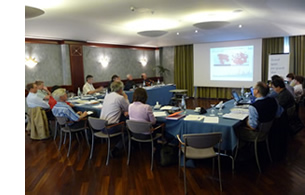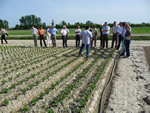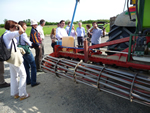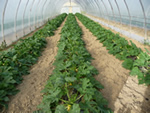
39th Meeting of the Working Party on Plant Protection Products
Torino (IT), 2009-05-12/14
 The 39th Meeting of the Working Party on Plant Protection Products took place in Turin, Italy, on 12-14 May 2009. Thanks are due to Professor Ludovica Gullino and her colleagues from the University of Torino, who provided organizational support and arranged a very interesting technical visit. There were 16 participants from 15 EPPO countries and ECPA.
The 39th Meeting of the Working Party on Plant Protection Products took place in Turin, Italy, on 12-14 May 2009. Thanks are due to Professor Ludovica Gullino and her colleagues from the University of Torino, who provided organizational support and arranged a very interesting technical visit. There were 16 participants from 15 EPPO countries and ECPA.
Special thanks are due to Mrs Karin Nienstedt of EFSA (European Food Safety Authority), who in spite of other obligations came to the meeting to inform participants about EFSA’s activities.
The EPPO Working Party on Plant Protection Products directs and supervises the technical work of many EPPO Panels concerned with the registration of plant protection products. The report of the meeting is prepared for the EPPO Council and Executive Committee to present in greater detail the discussions, decisions and recommendations which were made by the Working Party. Some of major points are summarized below:
EPPO Standards for approval
The Working Party on Plant Protection Products continues to approve a steady flow of new or revised EPPO Standards in series PP1: Efficacy Evaluation of Plant Protection Products. A total of 11 revised specific standards in this series are to be submitted to the Executive Committee and Council of EPPO in September 2009 for definitive approval and publication in the Bulletin OEPP/EPPO Bulletin:
- Weeds in grassland (PP 1/61)

- Weeds in strawberry (PP 1/92)
- Grassland renewal (PP 1/94)
- Weeds in forests (PP 1/116)
- Weeds on hard and semi-permeable surfaces [Weeds in non-agricultural land] (PP 1/117)
- Weeds in amenity grassland (PP 1/136)
- Weeds in tree and shrub nurseries (PP 1/141)
- Control of suckers in Rubus (PP 1/154)
- Regulation of growth in strawberry (PP 1/190)
- Whiteflies (Trialeurodes vaporariorum, Bemisia tabaci) on protected crops (PP 1/36) Otiorhynchus spp.on ornamentals and strawberry (PP 1/111)
A new standard on “Fungal diseases on Agaricus spp.” was returned to the Panel as it received substantial comments in the country consultation phase.
The extrapolation tables for the effectiveness of fungicides and insecticides for Solanaceous crops were approved by the Working Party following several recommendations and minor amendments. The tables for effectiveness of herbicides on vegetable brassicas, pome fruit and stone fruit in a new simplified format were also approved.
Programme of activities
The Working Party had a possibility to discuss the document on EPPO’s strategy and operational plan from 2010 to 2014.
The Working Party discussed the operational plan for 2010, in particular which panels should meet, and considered the working programmes of the panels for efficacy evaluation. These working programmes consist of a substantial list of specific standards which need to be revised or newly drafted.
The Working Party also discussed the EPPO strategy regarding plant protection for the period 2010-2014. It considered the outcome of a working group on the EPPO strategy (Paris, 2009-04-15) and also the outcome of the EPPO Workshop on the development of principles for comparative assessment in the framework of substitution of plant protection products (Brussels, 2009-05-06/07). The Working Party agreed to give high priority to increase the number of extrapolation tables, which are accompanying EPPO Standard PP 1/257 Efficacy and crop safety extrapolations for minor uses. The Working Party agreed how the work by experts on these tables should be organized in order to proceed faster and noted in to facilitate this the work on efficacy standards could receive a lower priority. The Working Party gave high priority to the continuation of EPPO’s work on resistance and proposed that the existing standard PP 1/213(2) Resistance risk analysis should be elaborated in view of comparative assessment to provide advice on effective resistance management in view of the reduced number of active substances. The Working Party gave high priority to developing guidance on how the process of comparative assessment should be carried out. The Panel on General Standards should work on this task. The Working Party gave low priority to a revision of Good Plant Protection Practice but felt that it was important that the Secretariat follow how an effective exchange of information on Integrated Pest Management could take shape in Europe.
The Working Party believed that the Working Party on Phytosanitary Regulations should be informed of the outcome of the Workshop on Comparative Assessment to be made aware of the possible impact of the new EU Regulation on the availability of PPP for phytosanitary (quarantine) purposes.
The next Working Party meeting is planned to take place in Denmark, 2010-05-22/24.
Technical visit
During the meeting the participants had an opportunity to visit the CADIR LAB S.r.l. laboratories, which conducts amongst other things, residues and mycotoxin analysis in plant and soil material. They then visited two minor crop horticultural sites in Alessandra province to see some of the specialist outdoor and protected crops grown, and to become acquainted with the pest management practices implemented in the region.





